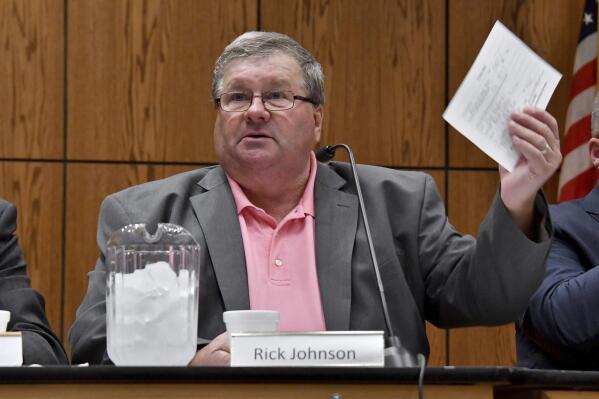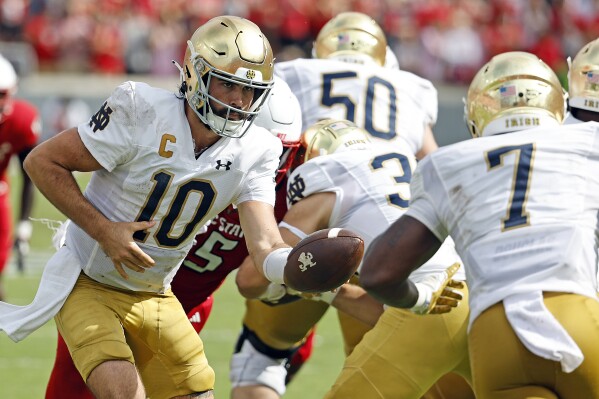Like his dad, retiring Mitt Romney embraced moderate conservatism. He fears the GOP has lost its way
Mitt Romney’s announcement this week that he will not seek another term in the U.S. Senate came with a distant echo of his father’s departure from politics five decades ago.
Mitt and his father, George Romney, at one time were top Republican contenders for the presidency, but fell short of the White House. Both ended their careers in elected office with a sense their party had lost its bearings. And both called for a more humane party, one that prioritizes civility and principle over resentments and score-settling.
In eras 50 years apart, George and Mitt Romney found themselves isolated in a GOP increasingly uninterested in their brand of genteel, country-club conservatism. In following a path forged by his father, sometimes with eerie similarities, Mitt Romney became the latest in a line of prominent establishment Republicans who pushed back against Donald Trump’s vision for the party, only to become isolated. Liz Cheney, who has declared it her mission to ensure Trump never returns to the Oval Office, was ousted in her U.S. House primary in Wyoming last year; Jeff Flake of Arizona opted not to run again for the U.S. Senate in 2018, condemning the “flagrant disregard of truth and decency.” That same year, Arizona Sen. John McCain, an unflinching Trump critic, died.
Mitt Romney’s career in business and politics included co-founding a private equity firm, being the savior of the Salt Lake City Olympics, serving as governor of Massachusetts and winning the GOP presidential nomination.
 Detroit-area businessman gets more than 2 years in prison for paying bribes for marijuana license
Detroit-area businessman gets more than 2 years in prison for paying bribes for marijuana license
 No. 9 Notre Dame looks to improve to 10-0 against MAC foes when Central Michigan visits
No. 9 Notre Dame looks to improve to 10-0 against MAC foes when Central Michigan visits
 JJ McCarthy leading on and off field for No. 2 Michigan, which hosts Bowling Green under the lights
JJ McCarthy leading on and off field for No. 2 Michigan, which hosts Bowling Green under the lights
He entered Election Day of 2012 at the doorstep of becoming the nation’s 45th president. Today, he is stepping back believing that Trump, who did become the 45th president in 2016 and is the party’s front-runner for the 2024 nomination, has led the GOP and the country away from some of their most cherished constitutional principles.
The nation’s many challenges call for a younger generation of leaders, the 76-year-old Romney said in his announcement Wednesday. He said the United states would be better served if Democratic President Joe Biden, 80, and Trump, 77, stepped aside from the 2024 campaign.
How Romney went from Republican standard-bearer to outlier coincided with Trump’s takeover of the GOP and the rise of the populist, anti-elite movement he leads. Romney was the only Republican senator to vote twice to impeach Trump. Romney was one of the few elected Republicans willing to criticize Trump in public, and he felt the pressure from his party’s base.
Skirmishes with the base were familiar for Romney, who was a teenager when his father first won elected office.
George Romney was a six-year governor of Michigan in the 1960s and clashed with Barry Goldwater, the Arizona senator who was the party’s 1964 presidential nominee, over the Civil Rights Act. The elder Romney was seen as a leading GOP contender for president in 1968, but his candidacy collapsed, fueled in part by a gaffe in explaining his change of position on the Vietnam War.
Richard Nixon won the Republican nomination and was elected president that year. He appointed Romney to head the U.S. Department of Housing and Urban Development, where Romney worked toward racial integration and clashed with the president.
George Romney was a gladiator with an appetite for political combat, particularly with his party’s right wing, said Geoff Kabaservice, a scholar at the center-right Niskanen Center who has written about the GOP’s rightward shift since the 1960s. Mitt Romney took on the more diplomatic persona of his mother, Lenore Romney, who ran for Senate from Michigan in 1970.
The younger Romney campaigned hard for his mother, who eked out a narrow victory in a contentious, ideologically driven primary. That fight hurt her in the general election, which she lost overwhelmingly.
“Mitt Romney was willing on an individual basis to stand up against Donald Trump. But Mitt Romney was not interested in trying to lead a Republican revolt against Trump,” Kabaservice said. “And Trump ultimately was willing to tear the Republican Party apart if he didn’t get his way.”
Mitt Romney spoke wistfully of his father’s political era when talking to Utah-based reporters this week.
“It’s hard for me to imagine what the party was like during his time,” Romney said, remembering a time when Americans respected members of other political parties even when they disagreed.
“I think we’ve become more suspicious of people on the other side of the aisle,” he said. “In part that’s the result of social media that feeds us stories and information that we find interesting through an algorithm that actually encourages resentment and anger.”
He said he belongs to the “wise wing of the Republican Party.”
Romney said he’s “not retiring from the fight” but did not share any specific plans for after he leaves office in January 2025.
He’s often been the subject of speculation about running an independent campaign for president, including as a potential candidate for No Labels, a group that is preparing to run a moderate ticket for president.
No Labels has had “no engagement at all” with Romney regarding a presidential run as part of the group’s potential third-party bid, according to a No Labels senior official who spoke on the condition of anonymity to disclose private discussions.
But the group’s leaders released a statement late Wednesday lauding Romney as “an exceptional public servant.”
“We welcome Sen. Romney to support our movement – and the will of most Americans – for more options in the 2024 election,” they said.
Romney considered an independent bid for president in 2024 but concluded it would only serve to help Trump get back to the White House, according to an excerpt of an upcoming biography by McKay Coppins, a journalist for The Atlantic who interviewed Romney extensively.
Romney said he decided months ago not to run again for the Senate. He was dismayed by what he saw as an authoritarian current rising in the GOP, and also cognizant of his advanced age.
“A very large portion of my party really doesn’t believe in the Constitution,” he told Coppins.
Romney’s departure from the political scene leaves an open question about the type of Republican who will succeed him in Utah, a deeply Republican state where the majority of residents are, like Romney, members of The Church of Jesus Christ of Latter-day Saints, known widely as the Mormon church. Many church members find Trump’s infidelity, profanity and anti-immigrant rhetoric anathema to their faith.
The state has elected both Romney, the most outspoken Republican Trump critic in the Senate, and Sen. Mike Lee, a brash conservative. Until recently, at least, the state’s version of Republicanism made room for both.
“It’s unclear what direction Utah voters will go,” said Christopher F. Karpowitz, a political science professor at Brigham Young University. “Is the next senator going to be more in the mold of Mike Lee or more in the mold of Mitt Romney? I think that’s the open question at this point.”
___
AP National Political Writer Steve Peoples in New York contributed to this report.
Disclaimer: The copyright of this article belongs to the original author. Reposting this article is solely for the purpose of information dissemination and does not constitute any investment advice. If there is any infringement, please contact us immediately. We will make corrections or deletions as necessary. Thank you.







